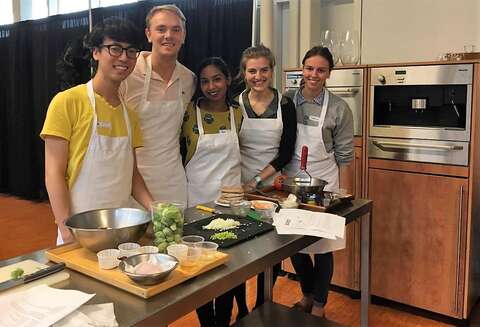Breadcrumbs
- Home
- MD/PhD Program
- News
- Foundations Curriculum student experience blog: a healthy take on nutrition
Foundations Curriculum student experience blog: a healthy take on nutrition
Alexandra Majerski, class of 2T0

On October 18 and 20, first year medical students took part in an exciting hands-on experience as part of the new Foundations Curriculum. On these two days, we traded our stethoscopes for aprons and put our culinary, rather than clinical, skills to the test by attending a cooking class and grocery store tour at Loblaws. The Centre for Child Nutrition and Health, through donors, funded both the creation of this in-store nutrition workshop and the week of Lifestyle Medicine into which the grocery store experience was integrated.
Something about shaping the patties for our lentil burgers and thinly slicing Brussels sprouts for a vitamin-packed salad, prompted discussion about the basic components of healthy meal planning and the ways in which the intake of healthy portions could be promoted and followed. A grocery store scavenger hunt encouraged students to read labels and interpret nutrition facts tables, but ultimately highlighted the challenges faced by consumers trying to make healthful decisions for themselves and their families. Furthermore, this experience afforded students the chance to reflect on their own nutrition knowledge and to consider how to translate healthy messages into their practice as physicians.
The epidemic of obesity is now recognized as one of the most important public health problems facing the world today. The reality is that all physicians will care for a significant number of patients in their practice who experience weight related health issues.
In the undergraduate medical education, an appreciation of nutritional science is an important cornerstone for the understanding, prevention, and treatment of obesity. A physician must not only be knowledgeable of the physiological mechanisms inhibiting weight loss, but also skilled at the task of breaching the topic of weight. A particular challenge facing current and future physicians is the mitigation of weight bias and weight stigmatization that have been found to be present amongst medical professionals to the same extent as in the general public.
In the same way that an effective drug regime can only be made by keeping in mind the medical history, lifestyle and social context of an individual, patient – management plans amenable to the values and goals of each patient must be devised. Lifestyle Week in the Foundations Curriculum and the in-store nutrition workshop were certainly steps in the right direction for addressing these complex and sensitive topics with our future patients.
This student experience article expresses the views of first year MD Program student Alexandra Majerski and is not meant to be representative of the entire student experience, nor represent the MD Program.
News


